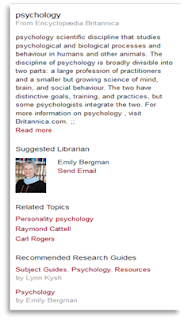Jessie Ransom, Solutions Architect, Ex Libris
One of my favorite things about libraries is how you can walk in looking for one thing and leave with so much more than you knew you wanted or needed. I have experienced this over and over, both as a patron and as a librarian. As a student, I spent a lot of time not asking for help in my university library, and instead relied on a bit of luck to find what I needed—stumbling upon the perfect book on the shelf, finding an excellent resource by looking up the references in a book or article, and a few times even asking a librarian for recommendations (crazy, I know).
This concept of exploration is something that I now consider to be an essential part of libraries. This is a fundamental value that libraries offer over the Google research experience. Google may give you what you are looking for, but it won’t give you all the resources you didn’t think to look for. As more and more patrons interact with the library online, and sometimes only online, it is important that we not lose this core added value. Because of the potential to expose relationships between resources, there are great opportunities for serendipitous discovery online, and both the Summonand Primo services incorporate features that bring this front and center to your patrons.
Virtual Browse: I undertook my undergraduate studies at a very large school with an equally large library. When I needed to do research I would stumble my way through the OPAC until I found something “sort of related” to the topic I was researching, then wander around that section of the library until I found enough information. The Virtual Browse feature in Primo takes this element of exploration and brings it online. Patrons can now navigate your stacks using the cover browse slider in Primo, which mimics the physical experience of exploring the shelves but also exposes items from different locations, items that are currently out on loan, and even ebooks if they have a call number. This is a great opportunity to explore additional resources on any topic.
Topic Explorer: When patrons perform a keyword search in Summon, the Topic Explorer pane opens on the right panel of the results screen, showing reference content, related topics, a recommended subject specialist to contact, and up to three research guides for the patron to explore. The topic explorer has over 50,000 topics associated with keywords found in actual Summon search logs, and it creates a great jumping off point for patrons to explore a new topic. As an undergraduate I had no idea there were subject specialist librarians, and I love that Summon points patrons directly to them as a resource.
bX Article Recommender: When patrons find an article that is interesting or useful to their research, the bX recommender will display recommended articles that may be helpful, exposing them to a set of cross-discipline resources and the potential to follow a chain of recommendations as far as they desire. bX uses anonymized data about researcher behavior to draw correlations between resources; researchers who read the first article also read the additional recommended resources. Because this is not simply a metadata match, these recommendations can be especially helpful for patrons who may not know all the right keywords to try when searching for a concept, something librarians are great at helping with that can be lost in self-guided search.
Citation Trail: The citation trail is a new feature in Primo. Now when patrons find an article that they’re interested in, they can explore the reference trails for that resource. With one click, patrons can link to articles cited by the resource, and articles that cite that resource. I love this feature; when I was in graduate school I spent a lot of time looking up articles from reference lists as a way of exploring a topic. Primo now makes it incredibly easy to find the related resources and expose patrons to material they might not have found otherwise.
Database Recommender: Sometimes the best result is simply the right database. The database recommender in Summon will match a search query to tags created by the library and the Summon community and suggest databases that the patron may want to explore. This is a great way for librarians to recommend specific resources for patrons who will never seek face-to-face help, and a great starting point for patrons who might be looking for a more targeted set of results.
Ex Libris understands that exploration is a fundamental part of learning and of the research process. All of these features are ones that will soon exist in both Primo and Summon, meaning your patrons will be soon able to take advantage of all these opportunities for serendipitous discovery, regardless of which product you currently use.






